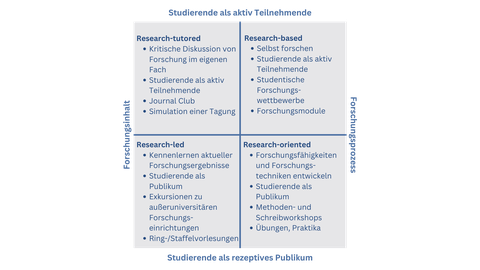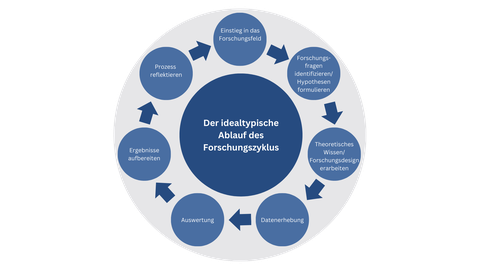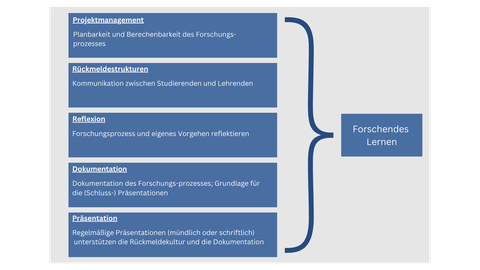Research-oriented teaching
Table of contents
What does research-oriented teaching mean at TU Dresden?
The understanding of research-oriented courses is reflected in coordinated courses that actively involve students in research so that they acquire knowledge in the subject and about research as well as practical skills.
The TUD's teaching mission statement promotes the development of research skills, active participation in research debates and the independent implementation of research projects.
- TU Dresden promotes research-oriented learning and teaching through the three program lines FOSTER - Funds for Student Research, Teaching Synergies Program(TSP) and Teaching Excellence Tracks(Teaching Excellence Tracks).
What characterizes teaching that is research-oriented?
Research-oriented learning and teaching manifests itself in the combination of teaching and research in university education.
Healey and Jenkins (2009) distinguish between different ways in which students approach research in teaching. For example, research can be thematized as content or as a process and can be consumed by students more receptively and as an audience or made accessible through active participation. The combination of the two axes results in a four-quadrant scheme that systematizes four different approaches to research in teaching. The aim at TU Dresden is to develop students to the research-based approach in which they learn to conduct and communicate their own research.
If research content is emphasized in courses, it is possible on the one hand to see students as an audience and to communicate current research findings. The content can be discussed, for example, in lecture series or series of lectures by guest lecturers or in connection with excursions to non-university research institutions.
The University of Hamburg offers an example of the implementation of research-led approaches within a course.
On the other hand, it is also possible to actively involve students and critically discuss research in their own subject. This can be integrated into teaching in the form of "journal clubs" for reading and discussing research results or the organization of (internal) conferences.
Examples of the implementation of research-tutored approaches within a course include the critical reading of research texts and studies as well as the mathematics reading workshop.
If the research process or the learning of research techniques is emphasized, this can be implemented in the form of exercises or practicals or even in the form of methods and writing workshops if the students are regarded more as an audience in the teaching.
Examples of the implementation of research-oriented approaches within a course include the digital data laboratory for geography and the virtual laboratory for preparing for pharmaceutical practicals.
If students are to actively design their own research process, the macro method of research-based learning is used. Here, students can conduct research as part of research modules or student research competitions.
What characterizes research-based learning?
"Research-based learning is a higher education didactic principle [and macro-method] that relies on the independence of students: learning through their own research" (Mieg, 2014, p.15).
In this form of teaching and learning, students follow a self-developed question and go through the entire research process (or only parts of it)(Sonntag et al. (2018). Research-based learning in the seminar. A guide for teachers). Through their research activities, they acquire subject-specific skills that are central to a topic or with regard to academic training (Klöber, 2020).
Thefollowing aspects are central to research-based learning (Huber, 2009)
- independent research by the students
- a research project that is also of interest to "third parties"
- complete (or partial) completion of the research cycle
© Leuphana Universität Lüneburg
The research cycle, which the students go through in whole or in part, can ideally be described as follows:
Research-based learning in university teaching requires a great deal of creative freedom on the one hand, but also harbors the risk of failure on the other. Five basic pillars are therefore proposed for the design of teaching that give students confidence in carrying out the research process.
Why combine research and teaching?
The implementation of research-based learning is based on various aspects (Huber, 2012):
- Education through science focuses on students' own searching and finding, problematizing, insight, astonishment, investigating, sharing.
- General skills are developed that go beyond mere specialist knowledge. These include Communication and teamwork skills, presentation techniques, the use of modern information technologies, intercultural skills and foreign language skills, the ability to condense and structure knowledge and information, and to continue learning on one's own responsibility (Wissenschaftsrat, 2000, p.21f).
- The constructivist view of learning assumes that the learner's own activity leads to living skills instead of inert knowledge. To this end, learning situations must be complex and offer the opportunity to learn in social contexts by means of authentic problems. (Mandl & Reinmann-Rothmeier, 1998)
- "Deep" learning begins when knowledge is self-organized, elaborated and critically reflected upon. The prerequisites for this are authentic problems, openness and complexity of tasks, but also time leeway.
Healy, M.J. & Jenkins, A. (2009). Developing undergraduate research and inquiry. Higher Education Academy.
Huber, L. (2012). Warum Forschendes Lernen nötig und möglich ist. In J. Brockmann, J.-H. Dietrich & A. Pilnoik (Hrsg.), Methoden des Lernens in der Rechtswissenschaft (S.59–89). Nomos Verlag.
Mandl, H. & Reinmann-Rothmeier, G. (1998). Auf dem Weg zu einer neuen Kultur des Lehrens und Lernens. In G. Dörr & K.L. Jüngst (Hrsg.), Lernen mit Medien: Ergebnisse und Perspektiven zu medial vermittelten Lehr- und Lernprozessen. (S.193-206). Beltz.
Mieg, H. (2017). Forschendes Lernen – erste Bilanz. In H. Mieg & J. Lehmann (Hrsg.), Forschendes Lernen: Wie die Lehre der Universität und Fachhochschule erneuert werden kann. (S.15–31). Campus Verlag.
Klöber, R. (2020). Charakteristika und Möglichkeiten forschenden Lehrens und Lernens. Scholarship of Teaching and Learning an der Universität Heidelberg. Heidelberg Inspirations for Innovative Teaching. 1(1), 11-26. https://doi.org/10.11588/hint.2020.1.77682
Sonntag, M.; Rueß, J.; Ebert, C.; Friederici, K.; Schilow, L. & Deicke, W. (2017). Forschendes Lernen im Seminar. Ein Leitfaden für Lehrende. Neue Lehre- Neues Lernen. Bologna.Lab.
Wildt, J. (2009). Forschendes Lernen: Lernen im „Format“ der Forschung. Journal Hochschuldidaktik, 20(2), 4-7.
Wissenschaftsrat (2000, 01 21). Empfehlungen zur Einführung neuer Studienstrukturen und –abschlüsse (Baccalaureus/Bachelor – Magister/Master) in Deutschland. Wissenschaftsrat. https://www.wissenschaftsrat.de/download/archiv/4418-00.pdf?__blob=publicationFile&v=1


